Related Research Articles
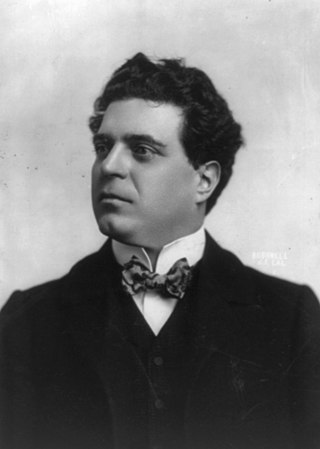
Pietro Mascagni was an Italian composer primarily known for his operas. His 1890 masterpiece Cavalleria rusticana caused one of the greatest sensations in opera history and single-handedly ushered in the Verismo movement in Italian dramatic music. While it was often held that Mascagni, like Ruggero Leoncavallo, was a "one-opera man" who could never repeat his first success, L'amico Fritz and Iris have remained in the repertoire in Europe since their premieres.
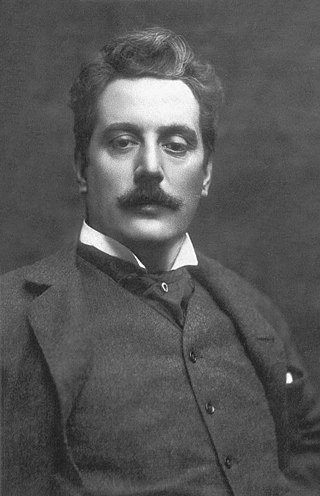
In opera, verismo, from vero, meaning 'true', was a post-Romantic operatic tradition associated with Italian composers such as Pietro Mascagni, Ruggero Leoncavallo, Umberto Giordano, Francesco Cilea and Giacomo Puccini.

Mario Del Monaco was an Italian operatic tenor.
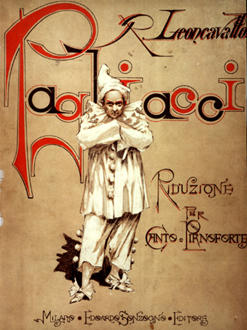
Pagliacci is an Italian opera in a prologue and two acts, with music and libretto by Ruggero Leoncavallo. The opera tells the tale of Canio, actor and leader of a commedia dell'arte theatrical company, who murders his wife Nedda and her lover Silvio on stage during a performance. Pagliacci premiered at the Teatro Dal Verme in Milan on 21 May 1892, conducted by Arturo Toscanini, with Adelina Stehle as Nedda, Fiorello Giraud as Canio, Victor Maurel as Tonio, and Mario Ancona as Silvio. Soon after its Italian premiere, the opera played in London and in New York. Pagliacci is the best-known of Leoncavallo's ten operas and remains a staple of the repertoire.
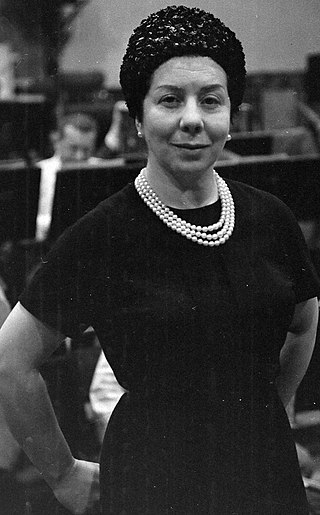
Giulietta Simionato was an Italian mezzo-soprano. Her career spanned the period from the 1930s until her retirement in 1966.

Le Villi is an opera–ballet in two acts composed by Giacomo Puccini to an Italian libretto by Ferdinando Fontana, based on the short story "Les Willis" by Jean-Baptiste Alphonse Karr. Karr's story was in turn based in the Central European legend of the Vila, also used in the ballet Giselle. The opera, in its original one-act version, premiered at Milan's Teatro Dal Verme, on 31 May 1884.

The Godfather Part III is the soundtrack from the film of the same name, released in 1990 by Columbia Records.
I Rantzau is an opera in four acts by Pietro Mascagni (1892), based on a libretto by Guido Menasci and Giovanni Targioni-Tozzetti, based on the play Les Rantzau (1873) by French writers Erckmann and Chatrian, after their novel (1882) Les Deux Frères.
Silvano is a dramma marinaresco or opera in two acts by Pietro Mascagni from a libretto by Giovanni Targioni-Tozzetti, based on a novel by Alphonse Karr. It received its first performance on 25 March 1895 at La Scala, Milan. Although rarely performed today, the music is of some technical accomplishment, and when revived, Silvano has been favourably received. The barcarolle from Silvano features prominently in a montage during the Martin Scorsese film Raging Bull.
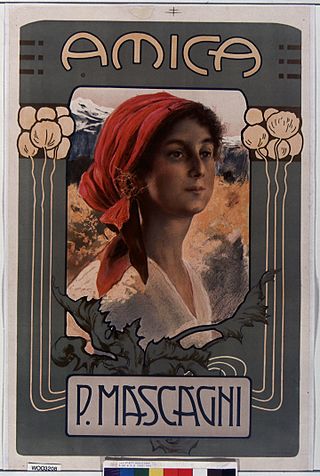
Amica is an opera in two acts by Pietro Mascagni, originally composed to a libretto by Paul Bérel. The only opera by Mascagni with a French libretto, it was an immediate success with both the audience and the critics on its opening night at the Théâtre du Casino in Monte-Carlo on 16 March 1905. Mascagni himself conducted the performance. The opera had its Italian premiere on 13 May 1905 at the Teatro Costanzi in Rome.

Lina Bruna Rasa was an Italian operatic dramatic soprano. She was particularly noted for her performances in the verismo repertoire and was a favourite of Pietro Mascagni who considered her the ideal Santuzza. Bruna Rasa created the roles of Atte in Mascagni's Nerone, Cecilia Sagredo in Franco Vittadini's La Sagredo and Saint Clare in Licinio Refice's 1926 oratorio, Trittico Francescano. She also sang the role of Tsaritsa Militrisa in the Italian premiere of Nikolai Rimsky-Korsakov's The Tale of Tsar Saltan.

Mese mariano is an opera in one act by Umberto Giordano. Its Italian libretto by Salvatore Di Giacomo was adapted from his play 'O Mese Mariano, which was in turn adapted from his novella, Senza vederlo. It premiered at the Teatro Massimo in Palermo on 17 March 1910. The opera is described as a bozzetto lirico and has a running time of 35 minutes. It tells the story of a woman who visits an orphanage to see her child. Racked with guilt at having abandoned him, she is unaware that he had died the night before.

Cavalleria rusticana is an opera in one act by Pietro Mascagni to an Italian libretto by Giovanni Targioni-Tozzetti and Guido Menasci, adapted from an 1880 short story of the same name and subsequent play by Giovanni Verga. Considered one of the classic verismo operas, it premiered on 17 May 1890 at the Teatro Costanzi in Rome. Since 1893, it has often been performed in a so-called Cav/Pag double-bill with Pagliacci by Ruggero Leoncavallo.

Cavalleria rusticana is a 1982 Italian film directed by Franco Zeffirelli based on Pietro Mascagni's 1890 opera of the same name. It stars tenor Plácido Domingo, mezzo-soprano Elena Obraztsova, and baritone Renato Bruson, all singing their own roles. Georges Prêtre conducted the Teatro alla Scala Orchestra for the movie's soundtrack. The film was made for broadcast on television. In 2003, it was released on DVD by Deutsche Grammophon, paired with Pagliacci, also starring Plácido Domingo and directed by Franco Zeffirelli.
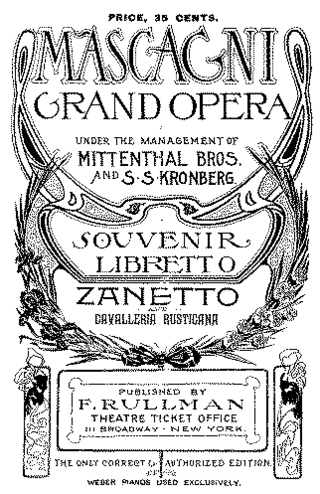
Zanetto is an opera in one act by Pietro Mascagni to an Italian libretto by Giovanni Targioni-Tozzetti and Guido Menasci. It received its first performance on 2 March 1896 at the Liceo Musicale Rossini in Pesaro. Only 40 minutes long and with cast of two singers, Zanetto was originally described by its composer as a scena lirica rather than an opera. It is set in the countryside near Florence during the Renaissance and tells the story of an encounter between a beautiful courtesan, Silvia, and a young wandering minstrel, Zanetto. The libretto was adapted from an Italian translation by Emilio Praga of François Coppée's play Le passant in which the young Sarah Bernhardt had won fame in the en travesti role of Zanetto.

Wilhelm Schüchter was a German conductor. Between 1959 and 1962, he was the music director of the NHK Symphony Orchestra in Tokyo and is credited for raising its standards to an international level. He was Generalmusikdirektor in Dortmund from 1962 until his death. He opened the new opera house in 1966 with Der Rosenkavalier by Richard Strauss, and conducted the world premiere of the opera Eli by Walter Steffens after the drama of Nelly Sachs in 1967. He left a legacy of opera recordings, especially of excerpts sung in German.
This is a partial discography of Pagliacci, an opera by Ruggero Leoncavallo which premiered at the Teatro Dal Verme in Milan on May 21, 1892 conducted by Arturo Toscanini.
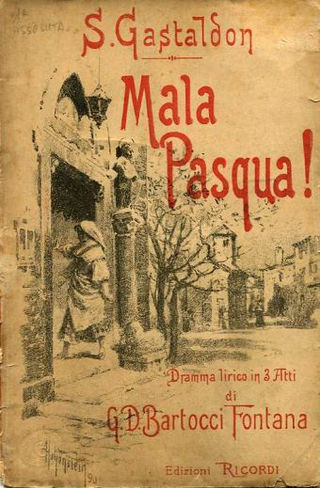
Mala Pasqua! is an opera in three acts composed by Stanislao Gastaldon to a libretto by Giovanni Domenico Bartocci-Fontana. The libretto is based on Giovanni Verga's play, Cavalleria rusticana which Verga had adapted from his short story of the same name. Mala Pasqua! premiered on 9 April 1890 at the Teatro Costanzi in Rome, six weeks before Pietro Mascagni's opera Cavalleria rusticana which was also based on Verga's play. Bartocci-Fontana's libretto adds some elements that were not in Verga's original and expands on others. The name of the Santuzza character was also changed to Carmela, but the basic plot and setting remain the same. Its title refers to the curse which Carmela places on Turiddu, the lover who had spurned her: "Mala Pasqua a te!". Following its Rome premiere, Mala Pasqua! had a few more performances in Perugia and Lisbon, but it was completely eclipsed by the phenomenal success of Mascagni's opera. After the 1891 Lisbon run it was not heard again until 2010 when it was given a semi-staged performance in Agrigento, Sicily.
Carol Louise Smith was an American contralto who made an international career in opera and concert, and was an academic teacher at the Musikhochschule Zürich and at the Indiana University Bloomington.
Marina de Gabaráin was a Spanish mezzo-soprano. Her international career began at Glyndebourne in 1952, where she appeared in Rossini's La Cenerentola as Angelina (Cinderella), which became her signature role.
References
- ↑ Recordings on the opera on operadis-opera-discography.org.uk Retrieved 6 February 2010
- ↑ Mallach, Alan (2002). Pietro Mascagni and His Operas, p. 298. University Press of New England. ISBN 1555535240
- ↑ Unless otherwise indicated, this discography is sourced from Recordings of Cavalleria rusticana on operadis-opera-discography.org.uk